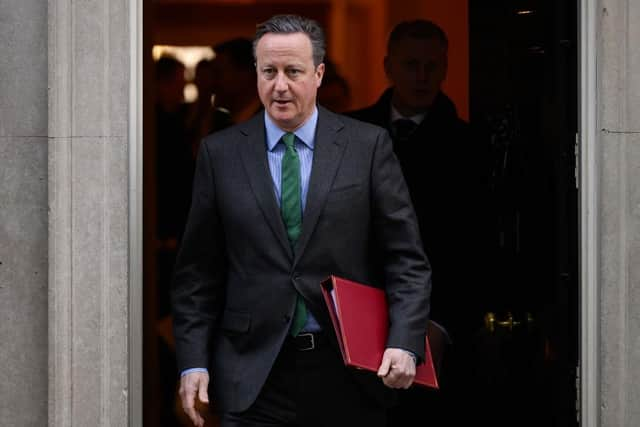David Cameron: UK to consider recognition of Palestine as state, foreign secretary says
The UK will consider recognising Palestine as a state, foreign minister Sir David Cameron has said, in a declaration that has sparked a backlash from Conservative MPs.
Speaking on Tuesday ahead of a visit to the Middle East, Lord Cameron said Palestinians need to be shown “irreversible progress” towards a two-state solution, which would create an independent State of Palestine alongside the State of Israel.
Advertisement
Hide AdAdvertisement
Hide AdThe prospect of a two-state solution is stalled, with Israeli Prime Minister Benjamin Netanyahu opposed to it.


Lord Cameron said it was "ludicrous" that humanitarian aid was unable to get through to Gaza. Lord Cameron urged Mr Netanyahu’s government to allow more aid as he claimed the past 30 years had been “a failure” for Israel, saying that despite economic prosperity, it had not been able to provide security to its citizens.
However, Conservative former Cabinet minister Theresa Villiers said bringing forward the recognition of a Palestinian state would “reward Hamas’ atrocities”. Party colleague Sir Michael Ellis said the move could risk equipping “dangerous actors” with the “trimmings and capabilities of a state”.
Stephen Crabb, another Conservative former Cabinet minister, described the gesture as “noble”, but questioned what “talk about early recognition” of Palestinian statehood would achieve.
Lord Cameron had earlier told the Conservative Middle East Council: "Together with that, almost most important of all, is to give the Palestinian people a political horizon so that they can see that there is going to be irreversible progress to a two-state solution and crucially the establishment of a Palestinian state.
"We have a responsibility there because we should be starting to set out what a Palestinian state would look like, what it would comprise, how it would work and crucially, looking at the issue, that as that happens, we with allies will look at the issue of recognising a Palestinian state, including at the United Nations.
"That could be one of the things that helps to make this process irreversible."
The United Kingdom currently does not recognise Palestine as a state. The UK has a non-accredited Consulate General in Jerusalem that "represents the UK government in Jerusalem, West Bank, and Gaza", and works on "political, commercial, security and economic interests between the UK and the Palestinian territories".
Advertisement
Hide AdAdvertisement
Hide AdLord Cameron said he was hopeful a deal was being considered by both Israel and Hamas.
"There is a path that we can now see opening up where we really can make progress, not just in ending the conflict, but progress in finding a political solution that can mean peace for years rather than peace for months," he said. The foreign secretary said a deal would be "difficult", but not impossible.
Foreign Office minister Andrew Mitchell responded by insisting there had been “no change” in UK policy, while Downing Street said recognition of a Palestinian state would take place “at a time it best serves the cause of peace”.
Mr Mitchell said: “There is no question of rewarding Hamas for the appalling acts they perpetrated in a pogrom on October 7. But the point the foreign secretary has been making is that we must give the people of the West Bank and Gaza a credible route to a Palestine state and a new future, but we must do so when the time is right.”
Comments
Want to join the conversation? Please or to comment on this article.
